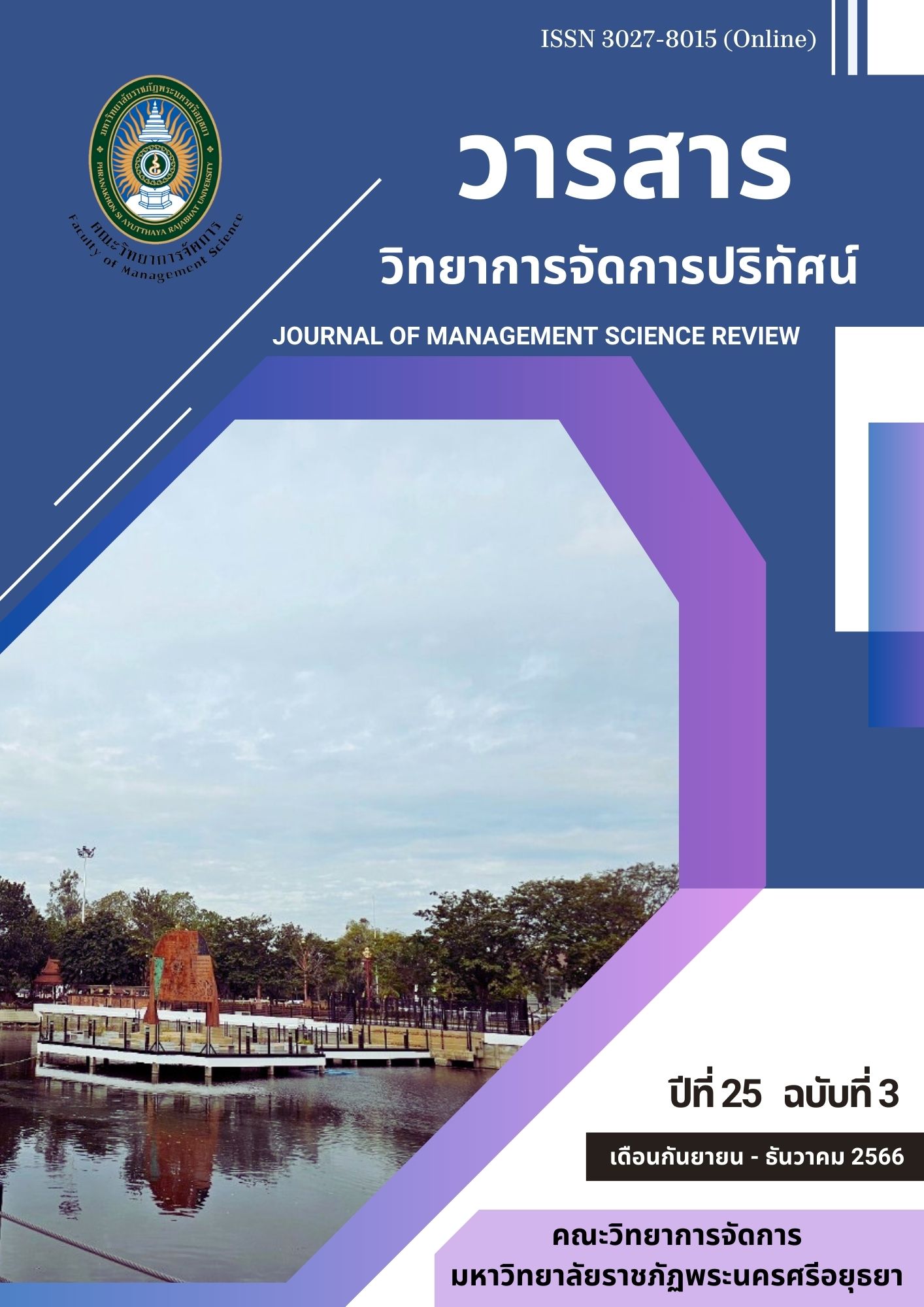ปัจจัยแรงจูงใจ และปัจจัยภายนอกที่ส่งผลต่อการตัดสินใจเป็นผู้ประกอบการธุรกิจเริ่มต้น(สตาร์ตอัป) ร้านอาหารในประเทศไทย
คำสำคัญ:
ปัจจัยแรงจูงใจ, ปัจจัยภายนอก, การตัดสินใจ, ผู้ประกอบการธุรกิจ, สตาร์ตอัปบทคัดย่อ
การวิจัยนี้มีวัตถุประสงค์เพื่อศึกษาระดับการตัดสินใจเป็นผู้ประกอบการธุรกิจเริ่มต้น (สตาร์ตอัป) ร้านอาหาร ในประเทศไทย และเพื่อศึกษาปัจจัยแรงจูงใจ ปัจจัยภายนอกที่ส่งผลต่อการตัดสินใจเป็นผู้ประกอบการธุรกิจเริ่มต้น(สตาร์ตอัป) ร้านอาหารในประเทศไทย การวิจัยนี้เป็นงานวิจัยเชิงปริมาณโดยใช้แบบสอบถามเป็นเครื่องมือเก็บข้อมูลจากผู้ประกอบการธุรกิจเริ่มต้น (สตาร์ตอัป) ร้านอาหารในประเทศไทย จำนวน 200 คน วิเคราะห์ข้อมูลโดยการหา ค่าเฉลี่ย ส่วนเบี่ยงเบนมาตรฐาน และการถดถอยเชิงพหุคูณแบบขั้นตอนเดียว
ผลการวิจัยพบว่า ระดับการตัดสินใจเป็นผู้ประกอบการธุรกิจเริ่มต้น (สตาร์ตอัป) ร้านอาหารในประเทศไทย ภาพรวมอยู่ในระดับมาก โดยด้านที่มีค่าเฉลี่ยสูงสุด คือ การตัดสินใจโดยคำนึงถึงเหตุ รองลงมา คือ การตัดสินใจโดยคำนึงถึงผล สำหรับระดับปัจจัยแรงจูงใจเกี่ยวกับการตัดสินใจเป็นผู้ประกอบการธุรกิจเริ่มต้น (สตาร์ตอัป) ร้านอาหารในประเทศไทย ภาพรวมอยู่ในระดับมาก โดยด้านที่มีค่าเฉลี่ยสูงสุด คือ ด้านความต้องการประสบความสำเร็จ รองลงมา คือ ด้านการตั้งเป้าหมาย ด้านที่มีค่าเฉลี่ยต่ำสุด คือ ด้านอดทนต่อความไม่แน่นอน ส่วนระดับปัจจัยภายนอกเกี่ยวกับการตัดสินใจเป็นผู้ประกอบการธุรกิจเริ่มต้น (สตาร์ตอัป) ร้านอาหารในประเทศไทย ภาพรวมและรายด้านอยู่ในระดับมาก โดยด้านที่มีค่าเฉลี่ยสูงสุด คือ ด้านเศรษฐกิจ รองลงมา คือ ด้านการเมือง และด้านที่มีค่าเฉลี่ยต่ำสุด คือ ด้านกฎหมาย ผลการทดสอบสมมติฐาน พบว่า ปัจจัยแรงจูงใจ และปัจจัยภายนอกมีผลต่อการตัดสินใจเริ่มต้นธุรกิจ(สตาร์ตอัป) ร้านอาหารในประเทศไทย อย่างมีนัยสำคัญทางสถิติที่ระดับ 0.05
เอกสารอ้างอิง
Barnard, C. I. (1938). The Functions of the Executive. Cambridge, MA: Harvard University Press.
Buchner, A. (2010). G*Power 3: A flexible statisical power analysis program for the social, behavioral, and biomedical sciences. Behavior Research Methods, 39, 175-191.
Burton, G., & Thakur, M. (2006). Management Today: Principles and Practice. New Delhi: Tata McGraw – Hill.
Cohen, J. (1997). Statistical power analysis for the behavioral sciences. New York: Academic.
Cronbach, L. J. (1970). Essentials of psychological testing. Harper & Row.
Erdfelder, E., Faul, F., & Euchner, A. (1996). GPOWER: A general power analysis program. Behavior research methods, instrument, & computers, 28(1), 1-11.
Gabrielsson, J. & Polits, D. (2011). Career motives and entrepreneurial decision-making: Examining preferences for causal and effectual logics in the early stage of new ventures. Small Business Economics, 36, 281-298.
George, R. Terry. (1949). Consumer Behavior. Chicago: University of Chicago Press.
Iamsri, E. (2011). PEST Analysis Understanding the “big picture” that causes change. Interfinn Business College. Retrieved May 16, 2023, from https://eiamsri.wordpress.com/2011/06/03/pest-analysis-
Korsukthaveekhoon, C. (2018). The studying of entrepreneurial motivation and intention of higher education students in Thailand [Master's Thesis]. Bangkok University.
Manchusree, K. (2017). SET Your Startup Business Guide. Bangkok: Stock Exchange of Thailand.
Mansoori Y., & Lackéus, M. (2019). Comparing effectuation to discovery-driven planning, prescriptive entrepreneurship, business planning, lean startup, and design thinking. Small Bus Econ, 54, 791–818.
McClelland, D.C. (1961). The Achievement Motive. New York: Prentice-Hall.
Norasetteekul, V. (2018). A Study of Entrepreneurial Characteristics, Key Success Factor, and Business Social Networking Affecting Thai Entrepreneurs Ability: Case of (Start-up) Entrepreneurs in Bangkok Metropolitan Area [Master’s Thesis]. Bangkok University.
Paireepairit, I. (2016). Thai Startup Founders Survey 2016. Brand Inside. Retrieved May 16, 2023, from https://brandinside.asia/thai-startup-founders-survey-2016/
Prasit, C. (2018). The relationship between external factors and business success of small and medium enterprises in Chachoengsao Province [Master’s Thesis]. Rajamangala University of Technology Thanyaburi.
Rotter, J. B. (1996). Generalized Expectancies for internal versus External Control of Reinforcement. Psychological Monographs, 80, 1-28.
Sadangharn, P. (2020). Decision-Making in Start-up Business of Generation Y at the Eastern Economic Corridor. Journal of Chandrakasemsam, 26(1), 75-87.
Seabnukol, P. (2017). Key Success Factors of Small and Medium Enterprise Entrepreneurs of Cosmetics Retail Sector in Bangkok. [Master’s Thesis]. Rajamangala University of Technology Thanyaburi.
Shane, S. (2003). A general theory of entrepreneurship: The individual-opportunity nexus. Cheltenham: Edward Elgar.
Srisa-Ard, B. (2017). Basic Research. 10 th ed.. Bangkok: Siveeriyasarn.
Sukbundit, P. (2018) Motivation factors, external factors, attitude towards start-up businesses Innovation Perception of opportunity This affects the intention of being a start-up entrepreneur of the population in Lak Si District Bangkok [Master’s Thesis]. Ramkhamhaeng University.
Supanet Saensena, S. & Butsaeng, T.(2017). The Critical Factors to Success of Startup Business. Retrieved May 16, 2023, From http://sc2.kku.ac.th/stat/statweb/images/ Eventpic/60/Seminar /01_1_Startup.pdf
Thao, T. P., Toan, P. C., Luong, H. D., & Hoa, N. T. (2022). Factors Affecting Entrepreneurial Motivation and Intention of University Students in Hanoi, Vietnam. International Journal of Modern Education & Computer Science, 14(2).
Watchara-anun, C. (2020). Factors Impeding the Deveopment of Start-up by Corporate in Thailand [Master’s Thesis]. Mahidol University.
Wiratchai, N. (2012). Sample size determination and interesting new analytical statistics. Bangkok: National Research Council of Thailand.
worapongthorn, T. & Worapongthorn, S. (2021). Sample size caculation for research project with G*Power program. Journal of Health Promotion and Environmental Health, 41(1), 11-21.
Workpointtoday. (2021). Revealing 6 startups, leading candidates for Thai 'unicorns'. Retrieved April 22, 2023, from https://workpointtoday.com/who-candidate-thai-unicorn
Yuwaree, A (2017). Factors Affecting Decision Marking for Beginning of Start-up Business [Master’s Thesis]. Thammasat University.





